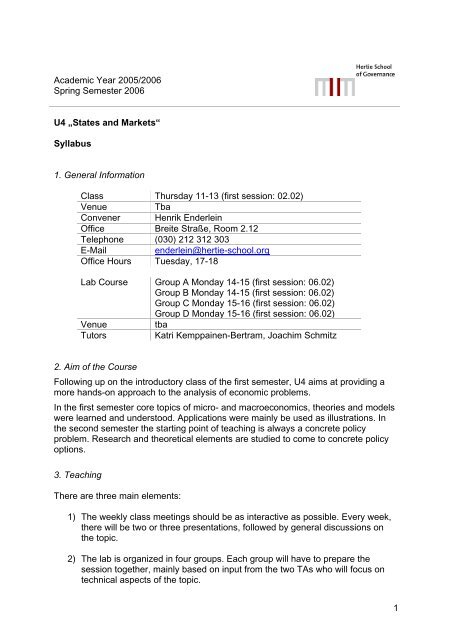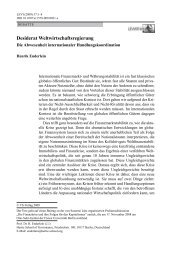Syllabus 1. General Information Class Thursday ... - Henrik Enderlein
Syllabus 1. General Information Class Thursday ... - Henrik Enderlein
Syllabus 1. General Information Class Thursday ... - Henrik Enderlein
You also want an ePaper? Increase the reach of your titles
YUMPU automatically turns print PDFs into web optimized ePapers that Google loves.
Academic Year 2005/2006<br />
Spring Semester 2006<br />
U4 „States and Markets“<br />
<strong>Syllabus</strong><br />
<strong>1.</strong> <strong>General</strong> <strong>Information</strong><br />
<strong>Class</strong> <strong>Thursday</strong> 11-13 (first session: 02.02)<br />
Venue<br />
Tba<br />
Convener <strong>Henrik</strong> <strong>Enderlein</strong><br />
Office Breite Straße, Room 2.12<br />
Telephone (030) 212 312 303<br />
E-Mail<br />
enderlein@hertie-school.org<br />
Office Hours Tuesday, 17-18<br />
Lab Course Group A Monday 14-15 (first session: 06.02)<br />
Group B Monday 14-15 (first session: 06.02)<br />
Group C Monday 15-16 (first session: 06.02)<br />
Group D Monday 15-16 (first session: 06.02)<br />
Venue<br />
tba<br />
Tutors<br />
Katri Kemppainen-Bertram, Joachim Schmitz<br />
2. Aim of the Course<br />
Following up on the introductory class of the first semester, U4 aims at providing a<br />
more hands-on approach to the analysis of economic problems.<br />
In the first semester core topics of micro- and macroeconomics, theories and models<br />
were learned and understood. Applications were mainly be used as illustrations. In<br />
the second semester the starting point of teaching is always a concrete policy<br />
problem. Research and theoretical elements are studied to come to concrete policy<br />
options.<br />
3. Teaching<br />
There are three main elements:<br />
1) The weekly class meetings should be as interactive as possible. Every week,<br />
there will be two or three presentations, followed by general discussions on<br />
the topic.<br />
2) The lab is organized in four groups. Each group will have to prepare the<br />
session together, mainly based on input from the two TAs who will focus on<br />
technical aspects of the topic.<br />
1
3) There will be a course website on Blackboard with readings. For each week,<br />
there is an “easy reading” (usually short articles from The Economist or<br />
Foreign Affairs or a similar source) and a “hard reading” (usually a state of the<br />
art research paper in economics). You have to read both pieces BEFORE the<br />
start of the lab on Monday.<br />
4. Requirements & Grading<br />
You are all required to prepare classes, to participate actively in class discussions,<br />
and to attend the Lab sessions.<br />
-- See the document “Rules of the Game” --<br />
Presentation 25%<br />
Report 30%<br />
Fact Sheet 20%<br />
Memo 15%<br />
Participation 10%<br />
6. Overview<br />
Please note that this schedule is indicative only. Depending on the time needed to<br />
wrap-up a topic, I will adjust the schedule as appropriate.<br />
Week Date Topic<br />
#1 02.02.2006 <strong>General</strong> Introduction<br />
#2 09.02.2006 Sugar/Cotton Subsidies and the WTO<br />
#3 16.02.2006 Growth, Innovation and Trade<br />
#4 23.02.2006 The IMF and the World Bank<br />
#5 02.03.2006 Globalization and the Size of Government<br />
#6 09.03.2006 The Oil Market<br />
#7 16.03.2006 Stock Market Crashes 1929 and 1987<br />
#8 23.03.2006 Monetary Policy: Fed & ECB<br />
#9 30.03.2006 Sovereign Defaults: Argentina & Russia<br />
#10 06.04.2006 Fiscal Policies in EMU<br />
#11 13.04.2006 China and the U.S.<br />
20.04.2006 +++ Easter Break +++<br />
#12 27.04.2006 From Communism to Capitalism<br />
#13 04.05.2006 The End of Poverty<br />
#14 !!05.05.2006!! Unemployment in Europe<br />
#15 1<strong>1.</strong>05.2006 The Economics of the Kyoto Protocol<br />
2
7. Detailed Schedule<br />
Session 1:<br />
Topic:<br />
9 February<br />
Sugar/Cotton Subsidies and the WTO<br />
Presentation : “Why do the US and the EU want to keep their cotton/sugar<br />
subsidies?”<br />
Fact-Sheet 1: “The organization of international trade cooperation”<br />
Fact-Sheet 2: “Trade Theories”<br />
Memo 1: “Briefing to the Trade Commissioner of the EU: How to react to the WTO<br />
decision that EU sugar subsidies are illegal”<br />
Memo 2: “Briefing to the President of Mali: Why US cotton subsidies are illegal”<br />
Session 2:<br />
Topic:<br />
16 February<br />
Growth, Innovation and Trade<br />
Presentation 1: “Why do some countries grow quicker than others?”<br />
Presentation 2: “A historical view on technology and growth”<br />
Fact-Sheet 1: “Determinants of Growth” (David Scheller)<br />
Fact-Sheet 2: “Measures of innovation” (Piotr Bonislawski)<br />
Memo 1: “Background memo on the Lisbon Strategy to the Dutch Ministry of<br />
Economic Afffairs prior to a meeting with a group of economists”<br />
Memo 2: “To the IMF Excecutive Board: Outlining a growth strategy for Iraq”<br />
Session 3:<br />
Topic:<br />
23 February<br />
The IMF and the World Bank<br />
Presentation 1: “Should the IMF and the World Bank be reformed?”<br />
Presentation 2: “Positive and negative effects of IMF programs”<br />
Presentation 3: “The Washington Consensus”<br />
Fact-Sheet 1: “The economic rationales behind the Bretton-Woods institutions”<br />
Fact-Sheet 2: “The role and set-up of the Bretton-Woods institutions”<br />
Memo 1: “Briefing to the IMF Chairman for a discussion with journalists on academic<br />
evidence that IMF programs do not generate growth”<br />
Memo 2: “Memo to the German IMF Executive Director: Should China be given more<br />
weight in IMF decisions?”<br />
3
Session 4:<br />
Topic:<br />
2 March<br />
Globalization and the Size of Government<br />
Presentation 1: “The impact of globalization on the size of government”<br />
Presentation 2: “Is globalization a new phenomenon?”<br />
Presentation 3: “International capital markets: benefactor or menace?”<br />
Fact-Sheet 1: “Measures of globalization”<br />
Fact-Sheet 2: “Do more open economies have bigger governments: the debate”<br />
Memo 1: “Memo to the Chairman of the German Social Democrats: does<br />
globalization call for smaller governments”<br />
Memo 2: “Memo to the CEO of Goldman Sachs for a meeting with Attac<br />
Representatives: on the usefulness of free capital markets”<br />
Session 5:<br />
Topic:<br />
Presentation 1:<br />
Presentation 2:<br />
9 March<br />
The Oil Market<br />
“The impact of the oil price on economic growth”<br />
“How to get energy: a comparison of different strategies”<br />
Fact-Sheet 1: “How long will oil resources last?”<br />
Fact-Sheet 2: “The oil market: set-up and functioning”<br />
Memo 1: “Memo to the Secretary <strong>General</strong> of OPEC for a meeting with journalists:<br />
why the recent rise of the prize of oil is justified”<br />
Memo 2: “Memo to the US President: Alternatives to Oil”<br />
Memo 3: “Memo the German Foreign Minister: Oil resources in Iraq”<br />
Session 6:<br />
16 March<br />
Topic: Stock Market Crashes 1929 and 1987<br />
Presentation 1: “Stock market crashes of 1929/1987 and their consequences”<br />
Presentation 2: “Are markets rational?”<br />
Fact-Sheet 1: “How to determine the value of a company”<br />
Fact-Sheet 2: “Capital market instruments”<br />
Memo 1: “Memo to the Governing Board of Attac: Should the stockmarket be<br />
criticized?”<br />
Memo 2: “Memo to the Chairman of the Federal Reserve Board: Should Central<br />
Banks pay attention to asset prices”<br />
Session 7:<br />
Topic:<br />
23 March<br />
Monetary Policy: Fed & ECB<br />
Presentation 1: “Transparency and accountability of a central bank”<br />
4
Presentation 2: “Do the ECB and the Fed behave differently?”<br />
Fact-Sheet 1: “Comparison of central bank strategies”<br />
Fact-Sheet 2: “International comparison of central bank mandates and strategies”<br />
Memo 1: “Memo to the ECB President: Differences between the Fed and the ECB”<br />
Memo 2: “Memo to the EU Commissioner for Economic and Monetary Affairs: When<br />
should accession countries join EMU?”<br />
Session 8:<br />
Topic:<br />
30 March<br />
Sovereign Defaults: Argentina & Russia<br />
Presentation 1: “The Russian Default”<br />
Presentation 2: “The Argentinean Default”<br />
Fact-Sheet 1: “Suggestions to improve the global financial architecture”<br />
Fact-Sheet 2: “International organizations and debt management”<br />
Memo 1: „Memo to the Chairman of the Institute of International Finance:<br />
Approaches to Private Sector Involvement”<br />
Memo 2: „Background memo to the Russian Finance Minister for a visit at the Paris<br />
Club”<br />
Session 9:<br />
Topic:<br />
6 April<br />
Fiscal Policies in EMU<br />
Presentation 1: “Inflation differentials in the euro area”<br />
Presentation 2: “The Stability and Growth Pact: why and how?”<br />
Fact-Sheet 1: “The legal set-up of the Stability and Growth Pact and the Excessive<br />
Deficit Procedure”<br />
Fact-Sheet 2: “Deficits and debt in euro area member states”<br />
Memo 1: “Memo to the German Finance Minister: The recent reform of the SGP”<br />
Memo 2: “Memo to the Polish Minister of Finance: Does Poland have to comply with<br />
the SGP?”<br />
Session 10:<br />
Topic:<br />
13 April<br />
China and the U.S.<br />
Presentation 1: “The US twin deficit”<br />
Presentation 2: “Is the yuan undervalued?”<br />
Fact-Sheet 1: “Advantages and drawbacks of different exchange rate regimes”<br />
Fact-Sheet 2: “Current imbalances in the Global Economy”<br />
Memo 1: “Memo to the US Treasury Secretary: Should the US dollar appreciate?”<br />
Memo 2: “Memo to the President of AFL-CIO: Chinese imports and US employment”<br />
5
Session 11:<br />
Topic:<br />
27 April<br />
From Communism to Capitalism<br />
Presentation 1: “Shock Therapy vs. gradual adjustment”<br />
Presentation 2: “How to privatize”<br />
Fact-Sheet 1: “An overview of transition strategies”<br />
Fact-Sheet 2: “The economic performance of transition countries”<br />
Memo 1: “Memo to the German Foreign Minister for a visit to China: The Chinese<br />
Miracle”<br />
Memo 2: “Memo to the German Economics Minister for a panel discussion: ‘Has<br />
transition in East Germany failed?’”<br />
Easter Break: Week of April 17 – April 21<br />
Session 13:<br />
Topic:<br />
4 May<br />
The End of Poverty<br />
Presentation 1: “Poverty in Africa: the main reasons”<br />
Presentation 2: “Fighting Poverty: an overview of strategies”<br />
Fact-Sheet 1: “Poverty in the World”<br />
Fact-Sheets 2&3: “Economic Theories on Development” (please share the work but<br />
hand-in two different fact-sheets)<br />
Memo 1: “Memo to the German Minister of Economic Cooperation and Development:<br />
should Germany spend 0.7% on GDP to development aid?”<br />
Memo 2: “Memo to the US Treasury Secretary: Why the US can’t spend 0.7% of<br />
GDP on development aid”<br />
Session 14: FRIDAY!!! 5 May 11-13h<br />
Topic:<br />
Unemployment in Europe<br />
Presentation 1: „Employment and Unemployment in Europe“<br />
Presentation 2: “The anglo-saxon labor market miracle – does it exist?“<br />
Fact-Sheet 1: “An overview of European labor markets”<br />
Fact-Sheets 2&3: Economic Theories of Unemployment (please share the work but<br />
hand-in two different fact-sheets)<br />
Memo 1: “Memo to the President of ETUC for a meeting with the ECB President:<br />
arguments against structural reform”<br />
6
Memo 2: “Memo to the Chairman of the Federal Reserve System for an interview<br />
with European journalists on unemployment in Europe”<br />
Session 14: Week of May 8 – May 12<br />
Topic:<br />
The Economics of the Kyoto Protocol<br />
Presentation 1: “The costs of the Kyoto Protocol for the US”<br />
Presentation 2: “Costs and benefits of the Kyoto Protocol”<br />
Fact-Sheet 1: “Economic approaches to the provision of public goods”<br />
Fact-Sheet 2: “The Kyoto protocol”<br />
Memo 1: “Memo to the US President: Why the US will not sign the Kyoto Protocol”<br />
Memo 2: “Memo to the President of the EU Commission for a meeting with members<br />
of the US Congress: why the US should adopt the Kyoto Protocol”<br />
Memo 3: “Memo to the Canadian Minister of Environment: Costs and Benefits of<br />
Kyoto for Canada”<br />
7




